Pre-Law Advising
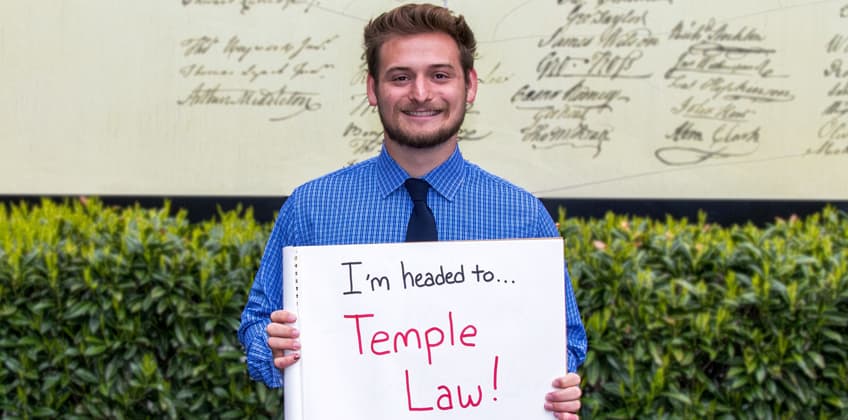
Maxwell Klenk holding sign, "I'm headed to Temple Law"
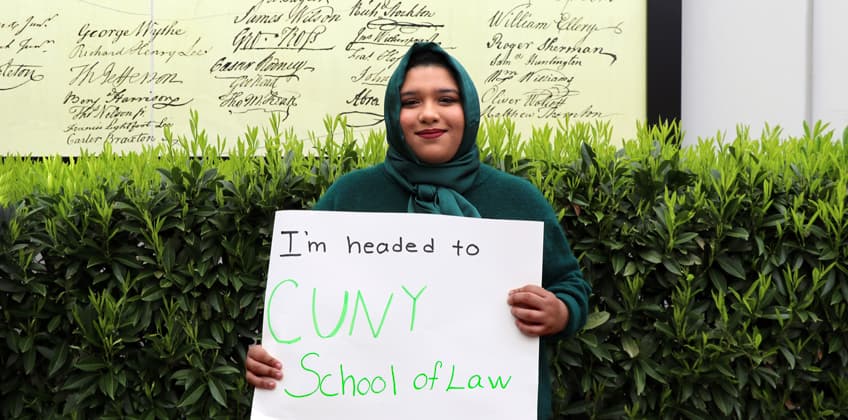
Syeda Sanjidha holding sign, "I'm headed to CU NY School of Law"
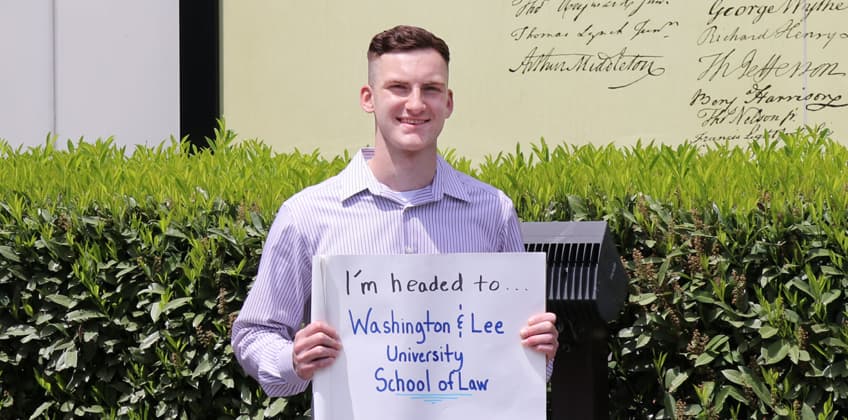
Daniel Theyn holding sign, "I'm headed to Washington & Lee University School of Law"
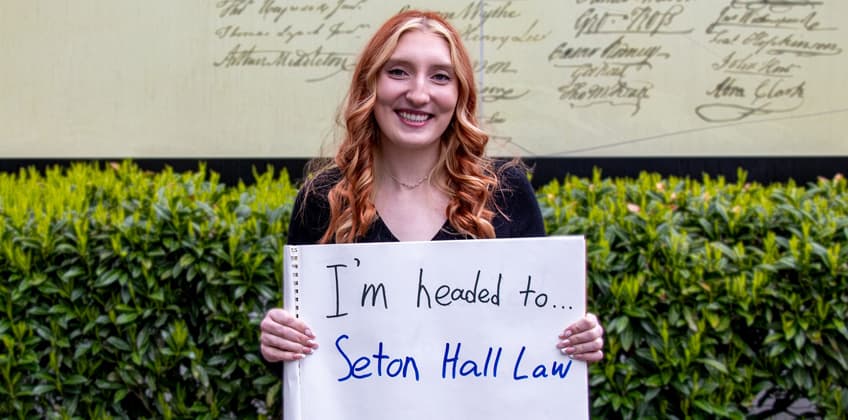
Jessica Shinski holding sign, "I'm headed to Seton Hall Law"
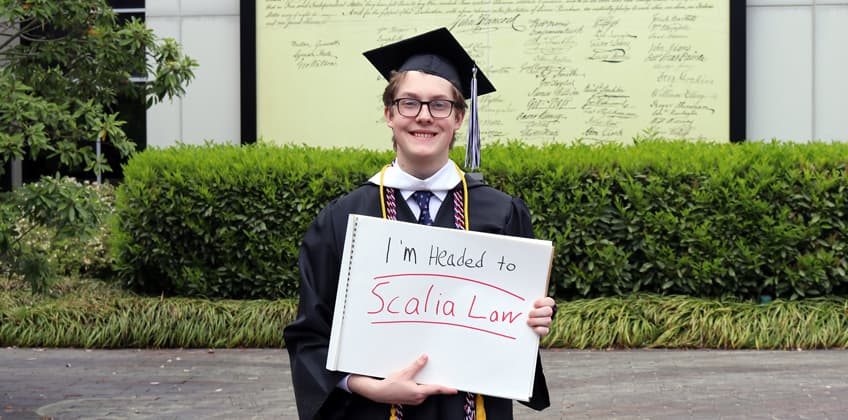
Aden Hochrun holding sign, "I'm headed to Scalia Law"
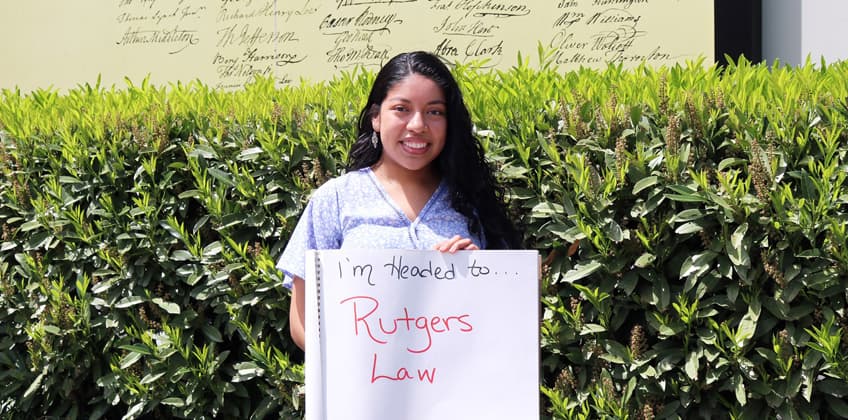
Vanessa Calixto holding sign, "I'm headed to Rutgers law"
Welcome to Stockton University’s Pre-Law Advising. Stockton University has a strong record of effectively preparing our students for the rigors of law school.
Our students have been accepted to top law schools – often with full or substantial merit scholarships – including Georgetown University, University of Pennsylvania Carey School of Law, Rutgers University, American University, Northeastern University, George Washington University, Cornell University, Temple University, and Villanova University, among others.
At Stockton University, Political Science, Economics, and Philosophy offer a pre-law concentration within their programs. All courses in each pre-law concentration provide instruction in substantive areas of law and enhance students’ skills in analytical and critical thinking, legal reasoning, writing, and comprehending judicial opinions.
In addition, our students are involved in extracurricular activities with clubs such as the Pre-Law Society, Minorities in the Law, Mock Trial, Model United Nations, and Amnesty International. Students have also secured internships, most notably through our Washington Internship Program, and studied abroad through our Office of Global Engagement. In the past decade, two Supreme Court Justices of the United States have visited Stockton University and met with our students through our civic engagement programming.
The Arcuri Wharton Pre-Law Fund supports students preparing for law school by providing a stipend for an LSAT preparation course. Learn more about this funding opportunity.
Please explore the site to learn more about the opportunities and resources for pre-law students at Stockton University.
Upcoming Events
Fall 2024 Pre-Law Workshop Series
Join our Pre-Law Advising Coordinator in Pre-Law Workshop Series, which are open to all Stockton University students interested in law school. The final workshop of the series is on:
- November 1st: Law School Personal Essay (Students register here)
Stockton University graduates have had extraordinary success in gaining admission to law school.
This success comes from students taking advantage of a rich array of legal studies courses that both help them get into law school and prepare them for success throughout their legal education. Courses in this concentration provide instruction in substantive areas of law and enhance students’ skills in analytical and critical thinking, legal reasoning, writing, and comprehending judicial opinions. The concentration is also valuable to students interested in paralegal careers. Students seeking certification in the pre-law concentration must consult with their program preceptor once each semester and obtain approval of selected courses.
Stockton’s pre-law courses and faculty dramatically eased my law school application process and helped me receive many generous offers from a number of schools. Having just left the program, I feel confident in my ability to start law school this fall, and I have built strong connections with the professors who have made this journey a possibility.

Stockton ’23
Temple Law ‘26
From organizing practice LSATs and events with different legal organizations, the Pre-Law Program at Stockton really prepared me for pursuing my legal career. The program's support, in particular, plays a pivotal role in providing first-generation and low-income students with invaluable exposure to the legal field that might otherwise have been inaccessible to them.

Stockton ’21
Cornell Law ‘25
Whether it was helping me organize my resume, writing letters of recommendation, or advising me on best steps to take through the process, all my professors were really supportive and accessible. From my experience, the Political Science faculty were genuinely invested in students as people and wanted to support students in finding the best path for them. I really enjoyed being a part of this caring community.
Stockton ‘21
Georgetown Law ’24 and recipient of the Arcuri Wharton Pre-Law Fund Award
Even before attending Stockton, I always knew I wanted to go to law school – I just had no idea how to do it. Stockton’s pre-law program not only taught me how to successfully apply to law school, but also how to be a successful law student. My professors continued to check-in throughout my time in law school and continue to act as mentors and references, truly demonstrating their commitment to helping students succeed long after their time at Stockton.
Stockton ’20
American University—Washington College of Law, ’23 and recipient of the Arcuri Wharton Pre-Law Fund Award
Stockton’s pre-law program put me in an excellent position to succeed in law school. The program’s courses and faculty helped me to develop essential skills before starting law school, which provided me with an advantage over my peers who were less prepared for its rigors.
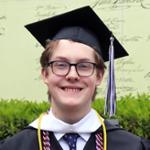
Stockton ’21
Antonin Scalia Law, George Mason University ’24
Stockton’s pre-law courses and advising helped me every step of the way to make sure I was on the best path for my future career goals.

Stockton ’23
Seton Hall Law ‘26
Stockton’s extensive alumni network of law students and lawyers provides invaluable contacts in the professional world that can help enormously in law school and after graduation.
Stockton ’06
Rutgers Law ‘09
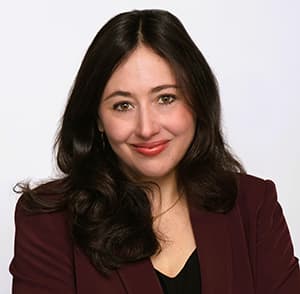
Lauren Balasco
Associate Professor of Political Science
Pre-Law Advising Coordinator
If you are interested in learning more about pre-law advising and academic programming at Stockton University, contact Lauren M. Balasco, Associate Professor of Political Science and Pre-Law Advising Coordinator | lauren.balasco@stockton.edu | 609.652.4743
Many thanks to Professor Emerita Linda J. Wharton for her research and consultation in developing this site.
The mission of Stockton University is to develop engaged and effective citizens with a commitment to life-long learning and the capacity to adapt to change in a multi-cultural, interdependent world. As a public university, Stockton provides an environment for excellence to a diverse student body, including those from underrepresented populations, through an interdisciplinary approach to liberal arts, sciences and professional education.
Stockton University is committed to providing a high quality, innovative education that gives our students, including those underrepresented populations, the breadth and depth they need to succeed in their lives beyond college. Our faculty and staff recognize a responsibility to engage our students in the development of ideas across and within disciplines, both inside and outside the classroom. We strive to enhance the student learning experience, by utilizing proven pedagogical methods, research, creative activity, and advancements in technology, which support the promotion of life-long learning.
At Stockton University, there are several academic programs that offer pre-law concentrations, including Political Science, Philosophy, and Economics. Further, academic programs such as Business Studies, Criminal Justice, Sustainability, and General Studies offer students a rich array of courses that enhance students’ writing and critical thinking skills and provide instruction in substantive areas of law.
Law schools accept students from a wide variety of academic backgrounds, and at Stockton University, we encourage students to study the subjects that inspire them to learn and succeed in their intellectual journey. Regardless of what students major in, our pre-law coordinator will work carefully with students to help them be the most competitive candidates possible for law school admission.
Yes! Stockton University’s Pre-Law Coordinator, Dr. Lauren Balasco, will work with students to:
- Select undergraduate courses to prepare for law school.
- Identify high impact and experiential learning opportunities throughout their college career.
- Decide where and when to apply.
- Apply to summer pre-law programs.
- Network with Stockton alumni in law.
- Know about law school expectations and rigor.
- Prepare for the LSAT.
- Craft a strong personal statement.
- Obtain letters of recommendation.
- Negotiate scholarships.
- Choose where to attend.
- Finance law school.
If you are interested in learning more about pre-law advising and academic programs at Stockton University, contact Lauren M. Balasco, Associate Professor of Political Science and Pre-Law Coordinator | lauren.balasco@stockton.edu | 609.652.4743
Stockton graduates have had extraordinary success in gaining admission and financial aid to a wide variety of nationally and regionally recognized law schools, including:
- Georgetown University
- George Washington University
- Cornell University
- College of William and Mary
- University of Pennsylvania Carey School of Law
- Rutgers University
- Seton Hall University
- Temple University
- American University (Washington College of Law)
- Northeastern University
- Drexel University
- Villanova University
- City University of New York (CUNY) Law
- Fordham University
- University of Virginia
- Delaware Law
- Brooklyn Law
- Cardozo Law
- Pace University
- Ohio State University
- George Mason University (Antonin Scalia Law School)
- Penn State University – Dickinson Law
- John’s Law School
- Washington and Lee University
Admission Success of Stockton University Students
|
YEAR |
Total Applicants- All Grads |
Total Applicants- Seniors |
Total Accepted at One or More Law Schools—All Grads |
Total Accepted at One or More Law Schools—Seniors |
Admission Success Rate— All Grads
|
Admission Success Rate— Seniors |
|
2022-2023 |
44 |
11 |
27 |
7 |
61.36% |
63.63% |
|
2021-2022 |
34 |
8 |
26 |
7 |
76.47 % |
87.50 % |
|
2020-2021 |
40 |
17 |
25 |
14 |
62.50% |
82.35% |
|
2019-2020 |
32 |
9 |
16 |
6 |
50% |
55.55% |
|
2018-2019 |
38 |
7 |
22 |
7 |
57% |
100% |
|
2017-2018 |
40 |
19 |
30 |
17 |
75& |
89.47% |
Stockton University offers a variety of high impact learning and experiential learning opportunities outside of the classroom. In addition to the Board of Trustees Fellowships for Distinguished Students, students have also served as research assistants for faculty as part of the SOBL Faculty-Student Research Showcase. In addition, our students are involved in extracurricular activities with clubs such as the Pre-Law Society, Minorities in the Law, Mock Trial, Model United Nations, and Amnesty International. Students have also secured internships, most notably through our Washington Internship Program, and studied abroad through our Office of Global Engagement.
The American Bar Association (ABA) does not recommend any specific undergraduate major to prepare for law school. Stockton University students from a variety of academic disciplines have been accepted and attend law school.
In addition, there are many specialties within the legal field you can pursue with a law degree. So, by enrolling in different courses, you can explore potential career interests in law.
Academic Goals and Law School Preparation
First Year
- Meet with pre-law advisor.
- Build relationships with your professors.
- Explore potential majors and minors.
- Excel in your coursework.
- Join an extracurricular club.
- Attend pre-law events on campus.
Sophomore
- Declare your major.
- Enroll in POLS 2215: Law School Basics.
- Take courses which build your critical thinking, writing, and research skills.
- Research potential LSAT preparatory courses and prices.
- Identify high impact learning opportunities (internships, study abroad, independent research).
- Attend pre-law events on campus; take a practice LSAT exam.
- Visit Career, Education and Development to work on your résumé and practice interviewing for internships and job opportunities.
Junior
- Attend law school fairs.
- Create an account at LSAC.org.
- Research potential law schools.
- Establish an LSAT preparatory plan for the summer.
- Take the LSAT in August or September before your senior year.
- Identify and ask potential writers for recommendation letters.
- Work on personal statement and get feedback from professors and pre-law coordinator.
- Apply to participate in a pre-law program.
- Review financial aid options for financing law school.
Senior
- Finalize your list of schools and review them with your preceptor and pre-law advisor.
- Review all application requirements and optional documents you need to submit.
- Register with the Credential Assembly Service 6-8 weeks before you submit your application.
- Visit the Writing Center to review your personal statement.
- Confirm deadlines with your recommendation writers, send thank you letters after submitting the application.
- Complete FAFSA by October 1.
- Submit applications, preferably by early November.
The best courses for you to take are ones that both interest and challenge you. Rigorous courses – those with intensive writing, research, and critical thinking assignments – are excellent choices to help prepare you for law school. You should also enroll in courses that give you the experience of reading and analyzing judicial opinions. We strongly encourage you to meet with your preceptor and pre-law coordinator when creating your course schedule.
At Stockton University, we offer a range of law courses from different academic schools, such as:
- POLS 3225 Civil Liberties
- POLS 2190 Introduction to Public Policy
- POLS 2211 Law and the Legislative Process
- POLS 2245 Race and Politics
- POLS 3221 Constitutional Law
- POLS 3313 The International Order
- POLS 3360 Comparative Politics of Human Rights
- POLS 3621 Advanced Constitutional Litigation
- POLS 3612 Gender and the Law
- ECON 2625 Perspectives on Law and Economics
- PHIL 1204 Symbolic Logic
- PHIL 1401 Problem Solving and the Law
- PHIL 1203 Critical Thinking
- PHIL 3100 Moral Theory
- PLAW 2120 Business Law
- PLAW 3110 Legal, Social, & Ethical Environment of Business
- CRIM 1100 Introduction to the Criminal Justice System
- CRIM 2108 Courts, Law, and Procedure
- SUST 3300 Environmental Policy and Law
Our students are involved in extracurricular activities with clubs such as Student Senate, the Pre-Law Society, Minorities in the Law, Mock Trial, Model United Nations, and Amnesty International. Check out Osprey Hub to learn about clubs and events on campus that speak to your interests.
Yes, many law schools throughout the country offer summer pre-law programs for undergraduates. Most of these pre-law programs are competitive but you are strongly encouraged to apply. Please review their websites for updated information regarding deadlines to apply, program dates, and cost of attendance (if any). Listed below are several local programs that may be of interest to Stockton students. In the past, Stockton University students have attended these programs and have found them enriching and rewarding.
University of Pennsylvania’s Carey School of Law’s Outreach Program is a partnership between the Law School’s Black Law Students Association and its Admission Office. The program “focuses on students who are ethnically diverse, first-generation college attendees, or who have disadvantaged backgrounds, and aims to help them successfully complete their bachelor’s degrees and apply to and enter law school.” The program is hosted annually, and sessions are conducted via Zoom on four Saturdays during the spring semester. Participants experience informational seminars on admissions, financial assistance, and hear from student/career panelists. Students also get personalized input on their resumes and personal statements from student mentors and experience a mock class presented by a Penn Carey Law professor. The program concludes with the participant’s completion of a “J.D. Action Plan.”
Drexel’s Kline School of Law’s Stephen and Sandra Sheller Diversity Pipeline Program offers “a free, three-week in-person summer immersion program for individuals from underrepresented backgrounds” who have completed at least one-year of college. The program includes LSAT preparation, review of the case method, clarification of the law school application process, linking participants with law students and lawyer mentors and an overview of legal specialties and areas of practice. Stockton students, Tiffany Giang (CRIM) and Lynn Tran (ECON), participated in Summer 2022.”
Seton Hall Law School’s Summer Institute for Pre-Legal Studies is a free five-week, residential, skill-building program, including law classes, LSAT prep and career orientation workshops, for college EOF students who are New Jersey residents. The program is rigorous and intensive with classes taking place Monday through Fridays from 9 a.m. to 5 p.m. Several Stockton students have participated in this program over the years.
Rutgers Law School’s Minority Student Program annually offers a one-day pre-law diversity conference on the Camden campus for underrepresented college students and graduates who are interested in learning about law school admissions, LSAT preparation, personal statements, law school courses, life as a law student and careers in law. The program is free and takes place on a Saturday in late January.
What offices at Stockton University can help me succeed in my coursework and prepare for law school?
Career, Education and Development can help students:
- Create a strong, professional résumé.
- Write a compelling cover letter.
- Prepare for interviews.
- Develop networking strategies.
- Find and apply for internship and employment opportunities.
Contact: Patrick Burns, Assistant Director of Career, Education and Development | Patrick.Burns@stockton.edu
The Tutoring Center is two centers in one: the Writing Center and the Math Center.
Both are staffed largely by undergraduate peer tutors recruited from the University at large and trained by the Tutoring Center coordinators. The Tutoring Center is an extension of the classroom experience, supporting the efforts of Stockton's faculty. At the core of the mission is the improvement of student performance across Stockton's curriculum.
Contact: J105 | Monday-Friday, 8:00a.m.- 5:00p.m. | 609-652-4441
The Learning Access Program is Stockton University's disability support services office. Our role is to educate, advocate and facilitate equal access while maintaining a welcoming, inclusive and accessible campus community. LAP engages in an interactive process with each student to determine appropriate accommodations on an individualized case-by-case, class-by-class basis. This practice is in accordance with Title II of the Americans with Disabilities Act (ADA) and Section 504 of the Rehabilitation Act in all of its policies, and procedures.
Contact: J-204 | Monday - Friday 9:00am-5:00pm | (609) 652-4988 | lap@stockton.edu
Stockton University offers a variety of high impact learning and experiential learning opportunities outside of the classroom. In addition to the Board of Trustees Fellowships for Distinguished Students, students have also served as research assistants for faculty as part of the SOBL Faculty-Student Research Showcase. Students have also participated in service learning leadership roles, such as the Bonner Leaders, Student Fellows, and ChangeBuilders.
Arcuri Wharton Pre-Law Fund: In honor and recognition of the contributions of former Pre-Law Advisors Alan F. Arcuri and Linda J. Wharton, the fund annually provides stipends to pay for LSAT preparation course and pairs recipients with alumni mentors.
Contact: Dr. Lauren Balasco or Dr. Mariam Majd | Co-Chairs of the Arcuri Wharton Pre-Law Fund Selection Committee
Constitution Day: Stockton University hosts a series of events in celebration of Constitution Day, including a keynote address by a leading expert on the Constitution or the Supreme Court. Past speakers include Akhil Reed Amar, Lorraine K. Bannai, Joan Biskupic, Julie Chi-hye Suk, Anita Hill, Bryan Stevenson, Nina Totenberg, Adam Winkler, Julian Zelizer, and Mary Ziegler. Students are eligible to serve as Constitution Day Fellows, who are key members of the Constitution Day Planning Committee.
Contact: Dr. Claire Abernathy or Dr. Lauren Balasco | Co-Chairs of the Constitution Day Planning Committee
Washington Internship Program: The Washington Internship program is an intensive para-professional and academic experience in which Stockton students live, work, and study in the Washington, DC metropolitan region. Stockton University is affiliated with the nation’s largest internship organization, The Washington Center. This organization provides all the major facets of a student’s internship experience, i.e., facilitating the application process; distributing the application to potential placement sites; providing program activities, advising, supervision, and evaluation; hiring faculty for the evening classes; and providing housing and residence life activities.
Contact: Dr. Michael Rodriguez | Stockton University liaison for the Washington Internship Program
Model United Nations: Stockton University Model United Nations is a campus-wide program supported by Academic Affairs and Student Affairs. An innovative experiential learning experience, academic sport clubs like Model UN bridge the gap between extracurricular and academic activities by increasing opportunities for our students to gain skills such as communicating complex issues concisely, dealing effectively with crises under a time constraint, working with people from a variety of backgrounds, solving challenges with creative solutions, and applying discipline-specific knowledge.
Contact: Dr. Tina Zappile, MUN Advisor
Education Abroad: high-impact practice of Stockton students pursuing education in a different country other than the U.S., including, but not limited to: enrollment in courses, experiential learning, internships, service learning, and other learning activities.
Law schools do NOT require previous legal experience. However, internships, volunteer work, or summer employment in the legal field can help you decide if law school is the right path for you.
LSAC is a nonprofit organization that provides resources and services about applying, attending, and financing law school. It will also be the portal you use to apply to law school. You can register for free to access information about law schools, sample LSATs, careers, scholarships, and law school forums. This is also where you sign up to take the LSAT and submit application materials including recommendations and transcripts.
Most law school applications consist of the following:
- Law School Admission Test (LSAT)
- Check out LSAC’s helpful FAQs about the LSAT. To review the full list of dates and register, check out the LSAC’s calendar here.
- Academic transcript
- Stockton University students should work with the Office of the Registrar to access their official academic transcript.
- Letters of Recommendation
- Identify writers who can speak to your strengths, accomplishments, and skills in and outside of the classroom. Give letter writers plenty of advance notice and discuss your goals and interests with them.
- Personal Statement
- Email the pre-law coordinator for a list of helpful resources for writing personal statements and accessing sample personal statements. Visit the Writing Center and get feedback from your advisor and the pre-law coordinator.
- Résumé
- Your résumé should be a clear statement that tells a story of why you are a compelling law school applicant by highlighting your interests, skill sets, and relevant experience. Visit Career, Education and Development to work on your resume and get feedback from your preceptor.
- Addendum
- Some law schools give you the opportunity to include optional statements to explain exceptional circumstances that you may not have room to discuss in your personal statement (ex: medical issue, criminal conviction, low GPA, etc.) It is important to consider if and when to include these additional materials. If you do decide to include an addendum, review these tips. If you are unsure whether to include an addendum, consult with your preceptor and pre-law advisor.
There are free LSAT workshops offered by law schools, non-profit organizations such Access Lex and the Council on Legal Education (CLEO) and free resources for LSAT preparation available through LSAC such as Khan Academy and Law Hub. Commercial LSAT prep companies such as Kaplan offer reduced-cost prep courses and scholarships to students who meet certain criteria. There are also a wide variety of commercial preparation courses, including Kaplan, Pluck, Blueprint LSAT, LSAT Max, PowerScore, Princeton Review.
The LSAT scale ranges from 120 to 180, with 120 being the lowest possible score and 180 being the highest possible score. Here are some short videos that help you understand your LSAT score.
Where you intend to apply matters; law schools with higher rankings tend to require higher LSAT scores.
For example:
- University of Pennsylvania Law School: 25-75% of admitted students scored between 167-173.
- Rutgers Law: 25-75% of admitted students scored between 155 and 160.
- Widener University-Delaware Law: 25-75% of admitted students scored between 148 and 152.
25th percentile: 1 out of 4 applicants with that score or lower got in and enrolled.
75th percentile: 3 of every 4 applicants at or above score are accepted and attend.
US News & World Report publishes an annual ranking of law schools. Speciality programs within law schools also vary in strength and ranking (e.g. international law, public interest law, tax law, clinical education, part-time etc.) so it useful to research rankings when it comes to specific specialties. These rankings are also available through US News & Report.
Determining which law schools to apply to is a time-consuming task that requires a lot of thought and reflection. A law school’s ranking is important to consider. The higher a law school’s ranking means there are prestigious and plentiful employment opportunities (e.g. large corporate firms, federal judicial clerkships, teaching positions, elite public interest organizations such as the ACLU NWLC). If you are interested in teaching doctrinal courses in law school or clerking for the US Supreme Court, then you must graduate from a top 14 law school).
Graduates of lower ranked schools still secure prestigious jobs if they excel during their time in law school. Depending on your career aspirations or personal finances, it may make sense to evaluate the tradeoffs between merit awards from lower-ranked schools or attending a higher-ranked school with little financial support.
It is also important to research a law school’s record on job placement and bar passage, which is easily accessible. The ABA requires disclosure of this data. 509 reports are on the Law School’s website—usually in the career services section.
In addition, you should consider the following questions when researching schools:
- Is the school highly competitive?
- Is the faculty accessible?
- What is the average class size?
- What is the grading curve?
- Are current students happy?
- Where is the campus located? City or suburban setting?
- What do students do for fun?
- Does the law school serve local residents via clinical programs?
- How many underrepresented minorities are there among the faculty and students? Do they have a Minority Student Program?
- Are they LGBTI friendly?
- Does the school have a certain religious orientation?
Answers to these questions may help you narrow down your list of top schools to apply to, so visit schools, attend law school fairs, and speak to as many current students and recent alumni as possible. Search the school’s website to gain insight into the services and programs they offer students.
Law school requires a serious financial investment of the student, but you do have options. Explore your financial aid options, and apply for scholarships. There are also resources available to help you understand student loan and debt. Aspiring law students should check out AccessLex Institute to research law schools and learn about financing your education.
Advising appointments are great opportunities to discuss a student’s short and long-term goals related to attending law school. During your conversation, it useful to:
- Discuss potential courses and majors that reflect the student’s interests. When reviewing a course schedule, make sure the student is set up for success with a balance between rigorous courses and time to study and engage in extracurricular activities.
- Assist the student in developing a clear and specific plan in carrying out short-term goals during the academic year (based on the schedule below).
- Review the student’s list of law schools; students should balance between applying to “reach” schools and safety schools.
- Provide feedback on a student’s personal statement.
- Assist in identifying potential writers for recommendation letters.
- Encourage the student to contact the Pre-Law Coordinator to set up an appointment.
- Share this website with the student.
First Year
- Meet with pre-law advisor.
- Build relationships with your professors.
- Explore potential majors and minors.
- Excel in your coursework.
- Join an extracurricular club.
- Attend pre-law events on campus.
Sophmore
- Declare your major.
- Enroll in POLS 2215: Law School Basics
- Take courses which build your critical thinking, writing, and research skills.
- Research potential LSAT preparatory courses and prices.
- Identify high impact learning opportunities (internships, study abroad, independent research)
- Attend pre-law events on campus; take a practice LSAT exam
- Visit Career, Education and Development to work on your résumé and practice interviewing for internships and job opportunities
Junior
- Attend law school fairs.
- Create an account at LSAC.org
- Research potential law schools.
- Establish an LSAT preparatory plan for the summer.
- Take the LSAT in August or September before your senior year.
- Identify and ask potential writers for recommendation letters.
- Work on personal statement and get feedback from professors and pre-law coordinator.
- Apply to participate in a pre-law program.
- Review financial aid options for financing law school.
Senior
- Finalize your list of schools and review them with your preceptor and pre-law advisor.
- Review all application requirements and optional documents you need to submit.
- Register with the Credential Assembly Service 6-8 weeks before you submit your application.
- Visit the Writing Center to review your personal statement.
- Confirm deadlines with your recommendation writers, send thank you letters after submitting the application.
- Complete FAFSA by October 1.
- Submit applications, preferably by early November.
You can always contact the Pre-Law Coordinator if you have specific questions about law schools and the application process.
The best courses for students to take are ones that both interest and challenge them. Rigorous courses – those with intensive writing, research, and critical thinking assignments – are excellent choices to help students prepare for law school. Students should also enroll in courses that give them the experience of reading and analyzing judicial opinions. We strongly encourage you to meet with your preceptor and pre-law coordinator when creating your course schedule.
At Stockton University, we offer a range of law courses from different academic schools, such as:
- POLS 2215 Law School Basics
- POLS 3225 Civil Liberties
- POLS 2190 Introduction to Public Policy
- POLS 2211 Law and the Legislative Process
- POLS 2245 Race and Politics
- POLS 3221 Constitutional Law
- POLS 3313 The International Order
- POLS 3360 Comparative Politics of Human Rights
- POLS 3621 Advanced Constitutional Litigation
- POLS 3612 Gender and the Law
- ECON 2625 Perspectives on Law and Economics
- PHIL 1204 Symbolic Logic
- PHIL 1401 Problem Solving and the Law
- PHIL 1203 Critical Thinking
- PHIL 3100 Moral Theory
- PLAW 2120 Business Law
- PLAW 3110 Legal, Social, & Ethical Environment of Business
- CRIM 1100 Introduction to the Criminal Justice System
- CRIM 2108 Courts, Law, and Procedure
- SUST 3300 Environmental Policy and Law
In general, law schools evaluate the following when admitting students:
- LSAT score
- Strength of undergraduate academic performance (undergraduate GPA)
- Involvement in extracurricular and leadership activities (quality of experience over quantity of activities)
- Outstanding recommendations from professors and professional mentors, supervisors
- Compelling personal statement
- Polished, professional resume
Preceptors can play an active and meaningful role in helping students develop each of these application requirements. The key is to keep an open and consistent dialogue during a student’s academic journey to help advise them each step of the way.
It is useful to review best practices for writing a letter of recommendation for a student.
- Tips for Avoiding Unconscious Racial Bias in Your Reference Letters
- Your Reference Letters for Women Might (Unintentionally) Be Less Than Stellar – Here’s How to Fix Them
If you feel you cannot speak to a student’s accomplishments, or provide specific evidence of a student’s growth, contributions, or academic excellence, you may want to suggest the student find another letter writer.
It is also important to be honest and realistic about timelines.
If a student provides short notice to write a letter, and you know you cannot write it in the time given, tell the student as soon as possible to find another letter writer. If you know a student plans on attending law school, and you anticipate that they may ask you for a letter, let them know how many weeks (or months) you need in advance to write the letter.
Consider meeting with the student to discuss their motivation for attending law school, and their experience at Stockton University.
These conversations may give insight into the challenges and life experiences of the student, which could provide important context to shape the content in your letter. Encourage the student to also send you their résumé, LSAT score, personal statement, and list of schools (and any other additional information that may help with writing the letter).
At Stockton University, there are several academic programs that offer pre-law concentrations, including Political Science, Philosophy, and Economics. In addition, academic programs such as Business Studies, Criminal Justice, Sustainability, and General Studies offer students a rich array of courses that enhance students’ writing and critical thinking skills.
The Political Science program offers majors the option of adding a Pre-Law concentration. Courses in this concentration provide instruction in substantive areas of law and enhance students’ skills in analytical and critical thinking, legal reasoning, writing, and comprehending judicial opinions. The concentration is also valuable to students interested in paralegal careers. Courses offered include:
- POLS 2215 Law School Basics
- POLS 3225 Civil Liberties
- POLS 2190 Introduction to Public Policy
- POLS 2211 Law and the Legislative Process
- POLS 2245 Race and Politics
- POLS 3221 Constitutional Law
- POLS 3313 The International Order
- POLS 3360 Comparative Politics of Human Rights
- POLS 3621 Advanced Constitutional Litigation
- POLS 3612 Gender and the Law
In addition, the Philosophy program and Economics program also have pre-law concentrations. Courses in these concentrations include:
- PHIL 1204 Symbolic Logic
- PHIL 1401 Problem Solving and the Law
- PHIL 1203 Critical Thinking
- PHIL 3100 Moral Theory
- PLAW 2120 Business Law
- PLAW 3110 Legal, Social, & Ethical Environment of Business
- ECON 2625 Perspectives on Law and Economics
- Two Students Receive Arcuri Wharton Pre-Law Fund Awards (April 22, 2024)
- South Jersey Young People Increasingly Applying to Law School (Press of Atlantic City, June 13, 2021)
- Two Students Receive Arcuri Wharton Pre-Law Awards (May 17, 2023)
- Nine Receive Alan F. Arcuri Pre-Law Awards (April 27, 2022)
- Six Receive Alan Arcuri Pre-Law Fund Awards (May 26, 2021)
- Two Students Receive First Alan F. Arcuri Fund Awards (April 30, 2019)

